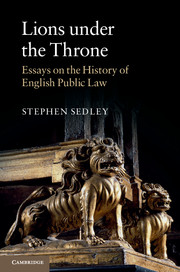Book contents
- Frontmatter
- Epigraph
- Dedication
- Contents
- Preface
- Introduction
- Part I Histories
- Part II Themes
- 6 The royal prerogative
- 7 The sovereignty of Parliament and the abuse of power
- 8 The right to be heard
- 9 The separation of powers
- 10 Public law and human rights
- 11 The state and the law
- 12 Standing and “sitting”
- 13 Law without courts: the tribunal system
- 14 The rule of law
- Index
10 - Public law and human rights
from Part II - Themes
Published online by Cambridge University Press: 05 November 2015
- Frontmatter
- Epigraph
- Dedication
- Contents
- Preface
- Introduction
- Part I Histories
- Part II Themes
- 6 The royal prerogative
- 7 The sovereignty of Parliament and the abuse of power
- 8 The right to be heard
- 9 The separation of powers
- 10 Public law and human rights
- 11 The state and the law
- 12 Standing and “sitting”
- 13 Law without courts: the tribunal system
- 14 The rule of law
- Index
Summary
Human rights are not a recent invention. The common law has recognised many of them for centuries, but the Human Rights Act 1998 put them on a statutory footing. Has this made the common law less or more relevant?
Rights and wrongs
Human rights represent a claim on the state which every individual can make. Some claims, such as the right not to be tortured, are unqualified and, if torture is proved, unanswerable. Others, such as the right to private life or to free expression, are heavily qualified, making their applicability case- and fact-specific. But there is nothing in principle or in practice which confines human rights to the sphere of public law: they crop up daily in family law cases, in libel actions and in criminal trials.
Why then is the intersection of human rights and public law of any particular interest? There are at least two reasons. First, if human rights are legal claims on the state, the legality of state conduct is the business of public law. Secondly, the common law, of which public law is a key component, tends to mimic its environment like a chameleon. The constitutional environment in recent years has included a developing culture of human rights, and public law, without becoming a different creature, has begun to take some of its colour from it.
Pretty well the entire substance of English public law is common law. It has been declared, developed, modified and refined over five hundred years and more by the judges, though always with constitutional deference to what Parliament enacts. The minimal primary and slightly more extensive secondary legislation affecting public law has been almost entirely procedural. An attempt by Margaret Thatcher's administration to abolish judicial review was quietly abandoned; so was David Blunkett's threat, as Home Secretary, to take away judicial review and appeal in all asylum cases. But the endeavour to downgrade law returned with the appointment in 2012 of the first legally unqualified Lord Chancellor for three centuries, followed in 2014 by the appointment of two junior barristers as the law officers of the Crown. With the massive reduction of legal aid and the tabloid-led pressure to repeal the Human Rights Act, the future, as I write, is uncertain.
- Type
- Chapter
- Information
- Lions under the ThroneEssays on the History of English Public Law, pp. 193 - 208Publisher: Cambridge University PressPrint publication year: 2015



